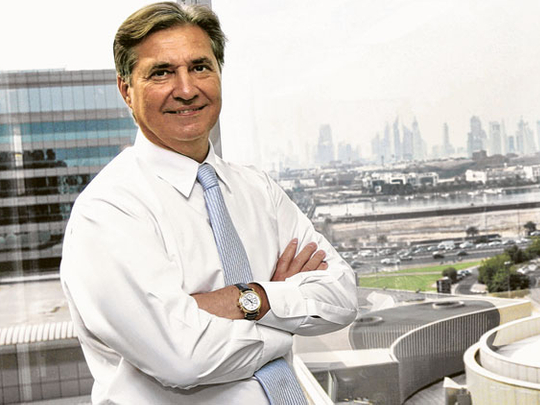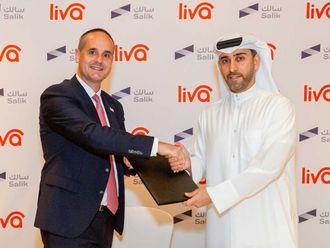
Dubai: The retail experience is one of the pillars that defines the Dubai landscape and one that the emirate's largest companies are exporting across the Middle East and North Africa.
One of the prime movers in this landscape is Majid Al Futtaim Properties, which aims to be the region's shopping mall specialist. MAF Properties honed its skills on malls such as Deira City Centre and Mall of the Emirates and, under the stewardship of chief executive Peter Walichnowski, has expanded to Bahrain, Oman, Egypt, Syria and Lebanon, among other nations.
Hotels and mixed-use developments form the other pillars on which MAF Properties' revenues rest, but malls remain the main driver of growth. The company says it welcomes more than 107 million customers a year at its 10 City Centre malls across the region. This is expected to see a quantum leap as it opens more.
Walichnowski spoke to Gulf News on diverse aspects of the retail business, especially his company's performance during the downturn in 2009 and his plans for the future. Excerpts from an interview:
GULF NEWS: How did the challenging years of 2009 and 2010 treat MAF Properties?
WALICHNOWSKI: Well, 2010 was better than 2009. And 2011 will be better than 2010! In our business, if you take Dubai as the bellwether, 2008 was an incredible year in terms of performance. We saw significant growth in sales coming from both, the resident market and tourists visiting Dubai. Then we saw the downturn, which we also experienced in our malls. But it really only lasted a year, or less, and then we saw stabilisation in 2010.
So, from 2008 to 2009 we saw a dip, then a sort of flat period through 2010, which is, under the circumstances quite good compared to the rest of the world.
We saw some improvement in the last quarter of 2010 in terms of a slight uplift in footfall at our malls. We're projecting that this uplift will project into 2011 and begin to trend up. In simple terms, it was quite a shallow dip, for us.
Can you give us percentages for these movements down and up?
I can't give you specific percentages, but here's the thing: the commentators were reporting that across Dubai, sales in shopping malls in 2009 dipped by about 25 per cent. Our sales were better than that. Our dip was still double-digit, but nowhere near 25 per cent.
But where your balance sheet is concerned, it's not the sales in the malls that determine the numbers, it's the rents that come from leasing space to retailers, am I right?
Footfall in the mall translates to sales in the shops. Which then translates to retailers paying rent and turnover rent. So we get the benefit.
Did you see any loss in rent or turnover rent in 2009?
At our malls, we've effectively got a hundred per cent occupancy. We didn't see that change even during the dip. Because we have the better malls, we think, and retailers tended to stick with the good malls. If they closed shops they did it in the periphery locations, the secondary malls.
As a result, during 2009, Mall of the Emirates and Deira City Centre still had hundred per cent occupancy. We're still popular malls in terms of destinations. We opened Mirdif City Centre in 2010, which is in what we call its stabilisation period. It takes 12 to 18 months for a mall to pick up its natural trade area — as people become familiar with it.
Even so, Mirdif has had a pretty good run even during 2010 and is following the trend we expected to see — in other words, improving sales and footfall month-on-month. As a company, we're quite pleased with how our portfolio in Dubai has performed under the circumstances.
What about the malls outside Dubai?
Generally speaking, the economies outside Dubai and the UAE were not as impacted during the downturn. Our malls in Oman and particularly Egypt were still improving. Alexandria, Cairo and Maadi, for example, saw no dip, even during 2009. We never really experienced the recession in Egypt.
And the hotels? What level of occupancy and room rates did you log?
Our hotels have performed in accordance with the general market in Dubai. We saw an initial dip in occupancy and a big drop in room rates. In 2010 we saw the tourists coming back and occupancy going up, back to where they were before 2009. But the room rates are still soft. Generally speaking, hotels are competing on room rates. It's going to be a few more years before we see room rates going back to where they were during 2008.
When do you see that happening?
Eventually. I mean, eventually, they will stop building hotels. And with the trend of Emirates and other airlines bringing in tourists, eventually it will go back up. But hotel revenue only represents about 4 per cent of our income, so we're not really dependent on hotels as a main driver.
What factors played the major roles in your malls division not feeling the effect of the downturn as sharply as the rest of the world?
Well, Mall of the Emirates, for example, has clearly got international brand recognition. Tourists were still coming here, and they were still going to places like Mall of the Emirates. They were spending less than they were in 2008, but the people were still coming.
What helped our malls get through the worst of it was providing the mix of retail and leisure that creates a destination. For people who live in Dubai, it's the convenience factor of doing all their shopping — from Carrefour to the highest end of the retail experience — at one location.
So, Dubai's emphasis on strengthening the pillar of tourism has worked for you?
Dubai obviously depends a lot on tourist traffic, because the number of malls that have been built in the city depend as much on tourism as on the local population.
The government has done a good job in keeping the tourists coming. Sure, there was a dip in 2009 in terms of the number of tourists and the amount of money they spent, but I think the statistics show that more tourists are coming back. And the numbers recorded by our malls bear that out. The numbers are increasing and they're beginning to spend more money.
So, I think we're quite optimistic about 2011, especially if you look at the surveys that show employers are going to recruit more staff, leading to more consumers. I see more optimism than pessimism going into 2011 and 2012. We're quietly optimistic that the worst is over for us.
Have you taken any steps to recession-proof the company for the future?
We're a shopping-mall specialist. And shopping malls are one of the best assets that can make a company recession-proof. People still have to eat, so people do their grocery shopping in our malls. And it is a well documented fact that during a recession, people tend to splurge on themselves personally. They may not make big-ticket acquisitions like a new house or a big car, but they splurge on themselves. They'll certainly go to the movies more often, they'll certainly eat out more. I've experienced this in my career generally — that during recessions, people are a bit pessimistic about the future and they tend to want to spoil themselves, or treat themselves to small luxuries. They don't want to sit in the house and feel miserable — they want to go out to the malls, they want to go to the coffee shops, buy little things, go to the movies… Shopping malls sort of provide the activities that make people feel a bit happier.
What's the status on The Wave in Muscat, your sole mixed-use development? Construction seems to be stretching endlessly.
The Wave is actually going very well. It's a joint venture with the Omani government. It's been going since 2005, but it's a very big development. A couple of thousand villas and apartments have been built and delivered. In fact, it's a success story that no one writes about! Last year, we had two off-plan launches for The Wave and they were phenomenally successful.
People say off-plan is dead, but certainly not in Muscat. Our launch in the first half of 2010 of the first phase of a new sub-division was sold out and the second stage launched in the second half was 60 to 70 per cent sold out.
Where are the buyers coming from?
At the moment they are local buyers and expats who live in Muscat. The speculators have dropped out and now it's a very owner-occupier market.
How much of The Wave have you completed?
Let see… There are four hotels proposed. An 18-hole golf course. A few thousand apartments and villas. A commercial precinct around the marina. We've probably got about a third of the residential built. We're about to start the first hotel. We've delivered nine holes of the golf course. We've started building some of the commercial precinct. And the marina is about 80 per cent finished.
Why has MAF Properties stopped with The Wave? Why have you not announced any other such mixed-use developments?
We do have some mixed-use going, but our strategy is centred around shopping malls. We don't want to be a generalist property company that builds everything. You would need a lot more capital if you want to be everything in all markets.
Sometimes, we get land that is too big to be just a shopping mall. So there is a chance to do other things with it. That's when we will consider hotels and mixed-use. But it has to be a part of the shopping-centre play. In two of our four new projects, we're doing more than just a shopping mall.
At the Khams Shamat in Damascus, in addition to the shopping mall, we have hotels, commercial and residential-type product. It's a long-term mixed-use product. In Beirut, there is a shopping mall. Next to it we've acquired a residential project called Waterfront — that's the working title. But we're not going out looking for land where we can build mixed-use developments. It has to be shopping-mall centred. We are focusing on becoming the shopping mall specialist in the Middle East and North Africa.
No plans to expand beyond Mena? To India, perhaps, or China?
We are looking at more projects in Egypt, Damascus, Beirut. Egypt and Levant are very much growth markets for us going forward. Beyond that we have an interest in Saudi Arabia — if and when we get the right opportunity.
How do you evaluate projects before deciding whether they are worth pursuing?
We use international best practice. There has to be a market that is relevant to our business model — in terms of disposable income.
We have to be able to get large pieces of land. We look at the competition — who is already there, who is proposing to come. We work closely with Carrefour, which has its own strategic plan.
And we do a lot of research — on the macro as well as micro level. These are large capital values that we are committing. So it could take up to two to three years from beginning to assess a project to actually doing something on site.
What is your strategy on corporate social responsibility (CSR), and what benefit do you see from implementing such initiatives?
We have quite an extensive CSR policy and we set targets and measure against those targets at the end of the year. So, we are very committed to CSR. We don't see it as a cost to the business. We see it as good corporate citizenship.
Our employees themselves are committed to what CSR stands for. We have a CSR policy that targets areas such as tenants and customers, community economic development, labour conditions in the supply chain, and resource efficiency. We take it quite seriously.
In the pipeline
Fujairah City Centre, UAE
Being developed in partnership with the government-owned Fujairah Investment Establishment, the mall will incorporate leisure and hospitality concepts over 30,000 square meters of gross leasable are (GLA). Due to be completed in 2012, the mall will facilitate the shopping needs of local residents and is expected to attract visitors from Fujairah and the surrounding emirates.
The Mall of Egypt, Cairo
Designed as the dominant super regional mall serving the western half of the greater Cairo metropolis, the 160,800 square meters of GLA is due to be completed in 2014 with a leisure offering to complement the value, fashion and lifestyle retail precincts that characterise Majid Al Futtaim Properties' malls. Recreation facilities will include a ski park, 15-screen cinema, family entertainment centre and an open air plaza hosting 18 restaurants.
The Mall of Syria, Damascus
Another super regional mall with 200,000 square meters of GLA, this development will be fully integrated in the Khams Shamat tourism development with access to a town square and hotels. The upcoming Khams Shamat development occupies a 1.5 million square meter site in the Sabboura/Yaafour area 17km west of Damascus and its first phase is due for completion in 2014. Besides the mall, the development will also host hotels, business districts, apartments and other modern civic amenities. The site is located in an area identified by the Syrian government for growth especially for the hospitality sector.
Beirut City Centre, Lebanon
Centrally located in Hazmieh, with access from all road networks, this mall will have a more than 180 specialty stores spread across 60,000 square meters of retail space. Due for completion in 2012, it will be anchored by a Carrefour hypermarket, a multiplex cinema and a family entertainment centre. Beirut City Centre will also offer an outdoor rooftop restaurant precinct and a food court with 16 outlets.
Profile
- Peter Walichnowski, chief executive of Majid Al Futtaim Properties, has more than 30 years experience in the development and management of major real estate projects around the world.
- He led the development of two of the most successful shopping and leisure destinations in the world: Bluewater in the UK and Mall of the Emirates in Dubai.
- Walichnowski graduated with a degree in architecture and joined Lend Lease in Australia where he spent 20 years in a career that covered all aspects of real estate development and management. He moved to London in 1990 where he spent 10 years as chief executive of Lend Lease Europe.
- He joined Land Securities in London, the largest listed British property company, as a director with responsibility for strategy and development.
- In 2002, Walichnowski joined the Majid Al Futtaim Group as chief executive of Majid Al Futtaim Investments. He was responsible for leading the strategy of developing a portfolio of major shopping centres throughout the Middle East and North Africa.
- In 2005, Walichnowski left MAF Investments and established Skylan Properties in North Asia with offices in China, Korea and Japan. He returned to Dubai in 2008 as chief executive of Omniyat Properties.
- In June 2009, Walichnowski took over as chief executive of Majid Al Futtaim Properties.
- He has completed post-graduate courses at Harvard Business School and IMD Switzerland.











